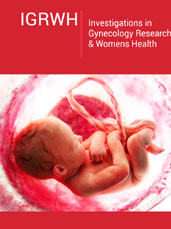- Submissions

Abstract
Investigations in Gynecology Research & Womens Health
Determinants and Prevalence of Cesarean Section in River Nile State, Sudan: A Cross-Sectional Study
-
Open or CloseMoustafa Suleiman Alkhaled1, Mohammad Mahmoud Abdulwahab1, Abdulhadi Ghanam Alsaleh1, Murtada Othman Altahir1, Fania Abdallah Elbadri2, Dalia Elmusharaf Khalifa3, and Mosab Nouraldein Mohammed Hamad4*
1Department of Community Medicine, Faculty of Medicine, Elsheikh Abdallah Elbadri University, Sudan
2ssociate professor, Obstetrics and gynecology, Faculty of Medicine, Elsheikh Abdallah Elbadri University, Sudan.
3Embryologist, Imperial College Healthcare NHS Trust, UK
4Assistant professor of Microbiology, Excellence Research Center, Elsheikh Abdallah Elbadri University, Sudan
*Corresponding author:Mosab Nouraldein Mohammed Hamad, Assistant professor of Microbiology, Excellence Research Center, Elsheikh Abdallah Elbadri University, Berber, Sudan
Submission:June 23, 2025;Published: July 08, 2025
Abstract
Background: Cesarean Section (CS) rates have been rising worldwide, often surpassing the World Health Organization’s recommended 10-15%. Understanding local trends and factors influencing CS rates is crucial for improving maternal health. This study aimed to determine the proportion of CS and identify the factors influencing its occurrence in River Nile State, Sudan, during 2024.
Methods: A descriptive cross-sectional study was conducted from August 2023 to July 2024, involving 226 pregnant women admitted to maternity wards in River Nile State. Data were collected through structured interviews and review of medical records, focusing on demographic data, obstetric history, and delivery preferences. Statistical analysis was performed using SPSS to explore the relationship between these factors and the type of CS (planned vs. emergency).
Result: The Cesarean Section Rate (CSR) was found to be 49.7%. Planned CS accounted for 65.5% of cases, while emergency CS made up 34.5%. Significant associations were identified between the type of CS and factors such as living environment (P=0.014), history of preterm deliveries (P=0.002), and previous CS history (P=0.000). The majority (95.2%) of participants reported that their choice of CS was heavily influenced by medical recommendations from their doctors.
Conclusion: The elevated CSR in River Nile State highlights a reliance on planned cesarean procedures, particularly in rural areas, likely due to limited emergency care options. These findings emphasize the need for targeted strategies to support safe vaginal deliveries and better management of maternal health risks. Further research is recommended to address regional disparities and ensure that CS is reserved for cases with clear medical indications.
Keywords:Cesarean section; Maternal health; Emergency CS; Planned CS; Sudan; River nile state, Obstetric care; Healthcare disparities
 a Creative Commons Attribution 4.0 International License. Based on a work at www.crimsonpublishers.com.
Best viewed in
a Creative Commons Attribution 4.0 International License. Based on a work at www.crimsonpublishers.com.
Best viewed in 








.jpg)






























 Editorial Board Registrations
Editorial Board Registrations Submit your Article
Submit your Article Refer a Friend
Refer a Friend Advertise With Us
Advertise With Us
.jpg)






.jpg)














.bmp)
.jpg)
.png)
.jpg)










.jpg)






.png)

.png)



.png)






